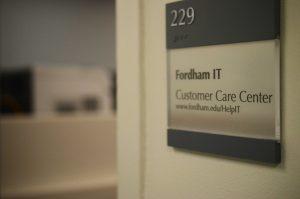
By Faustino Galante
By no means am I a tech-savvy person. Though I can successfully navigate the Internet for illegal sport streams and can occasionally crank out somewhat pretty-looking PowerPoints, I am no better at solving technological issues than my middle-aged mother. My first instinct when my computer acts up is to panic.
In the past year, Fordham’s IT department has made changes to our Wi-Fi network and My.Fordham accounts in an effort to establish greater security measures. In March, IT Communications Director Elizabeth Cornell, Ph.D. sent out a university-wide email outlining the integration of a new Multi-Factor Authentication (MFA) system known as Duo security. Duo is a company used by various other academic institutions and businesses in order to provide “an additional layer of security” to our online accounts.
This past August, the university’s IT department unveiled yet another “advancement:” a “new and improved” wireless network. Similar to the motives behind the integration of MFA, Fordham’s change in campus Wi-Fi was rooted in a drive to promote a more secure connection on campus.
Security is imperative in the context of 21st century technology; all too often, accounts and networks are hacked in an effort to steal and exploit information. User-friendly capabilities, however, are also vital to technology.
Though I understand the intentions behind Fordham’s IT department’s launching of MFA and a new Wi-Fi network, many of the changes have caused frustration and confusion among students at Fordham. In many regards, the inconveniences caused by these advancements minimize the security benefits which they provide. A day after moving back into school, my inner George Costanza found itself in full effect. My iPhone fell off my bed onto the floor and though the screen was still intact, the phone refused to turn on and completely stopped working. Little did I know of how many problems this would cause me. For starters, I had to go to Walgreens the next day to buy myself an alarm clock.
Owning a smartphone is an integral part of Fordham’s Multi-Factor Authentication system, as one must use a phone to verify one’s identity when logging into one’s Fordham account. Without a phone, I was unable to log into my account. Though Fordham emphasizes that one should register a backup device with Duo to prevent this sort of situation, I am not fortunate enough to own a reserve device. For the first four days of classes I was effectively barred from logging into Blackboard and my online Fordham account as a result of MFA.
Personally, I believe that the integration of MFA onto Fordham’s campus is overkill. Firstly, one must recognize the fact that our My.Fordham accounts are not necessarily prime targets for hackers. What’s the worst a hacker can do, pay my tuition? Drop one of my registered classes?
It is also important to note that the integration of MFA is not free. Fordham University has to pay Duo to grant us access to their system. I tried calling Duo Security in an attempt to find an estimate how much the university pays for their services. After being placed on hold for twenty-five minutes and having my call transferred three times, I was told that this information could not be revealed. It is important to note, however, that Fordham likely pays Duo a fair amount of money for MFA capabilities.
As Machiavelli would say, “Do the ends justify the means?” In the context of Fordham’s Multi-Factor Authentication System, my answer would be no. Not only does MFA cause inconveniences for students, but IT is also spending university money on a system which is practically unnecessary.
Like MFA, Fordham’s new Wi-Fi network also hosts some issues. According to IT Director Elizabeth Cornell, the integration of the new internet system brings updated network security and a more reliable, user-friendly experience. Thus far, the Wi-Fi has unfortunately given me, and others, more problems than in previous years as the updated security measures make the network registration a huge inconvenience. To register a device, one needs to connect to a separate network “Connect-Fordham-Wifi”, login with their student account, and download a Fordham sanctioned security firmware. The process causes much confusion and is truly the opposite of “user-friendly.” Furthermore, in regards to internet speeds and reliability, virtually nothing has changed since last year.
Upon calling the campus IT Department, an operator gives the direction to press one “if your call is related to connecting to campus Wi-Fi or Multi-Factor Authentication.” This option demonstrates that IT receives an excess of calls regarding these new “security” developments. While the integration of Multi-Factor Authentication and a new Wi-Fi network may indeed keep students secure online, I believe that the inconveniences caused by these two changes overshadow the potential security benefits involved with the establishments of MFA and our new campus Wi-Fi network.




































































































































































































